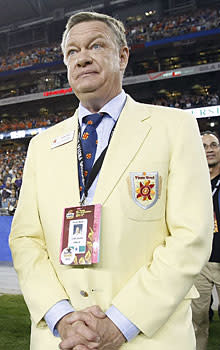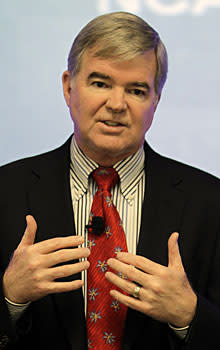BCS conducts shallow probe as party rages on
The Bowl Championship Series is so troubled by the graft exposed in Tuesday's Fiesta Bowl corruption report that it appointed a special "task force." Among the members is an athletics director who accepted a free Caribbean cruise from the Orange Bowl just last summer.
Yes, there's nothing like having a guy – in this case, Southern Mississippi's Richard Giannini – who takes lavish gifts from one bowl game to judge another bowl game for giving out lavish gifts.
The obvious news from Tuesday's 276-page Fiesta Bowl report is that longtime CEO John Junker was fired and is in major legal trouble, in part because of the eye-popping way his bowl game was run – $1,200 strip-joint bills tend to generate news interest. The real issue is that the BCS is doing what the Fiesta Bowl originally tried to do: conduct a shallow investigation and hope the party is allowed to rage on.
Tuesday revealed a bowl game involved in illegal political donations, massive kickbacks to college administrators and obscene financial abuse. In just one example, the Fiesta paid Junker's membership at four separate country clubs in three states.
The BCS wants the problem to be seen as isolated. The task force has been empowered to "evaluate the bowl's findings and its recommendations," according to Penn State president Graham Spanier.
There is no mention of doing what common sense would suggest: asking what the heck the other bowls are doing and then examining their finances too. After all, the federal tax filings of some other major bowls show similar non-itemized expenditures, executive salaries and profit margins.
Spanier must belong to the popular Big Ten chapter of the Little Sisters of the Naïve if he thinks that, while milking a multimillion dollar cash cow, the only bowl executives who considered laying the corporate AMEX down at the gentlemen's club or accepting a $27,000-per-year car allowance or throwing four-day $33,000 birthday parties were Junker and his crew.
The other BCS games? Nope, no need to even ask. Second-tier bowls which pay their executives even more than Junker's nearly $600,000? Nothing to see here, folks.
The BCS is not a system to determine a champion in college football.
It's a system designed to continue to allow bowl games to operate and profit from the sport's postseason. It's the single-most illogical business arrangement in sports. Go find another company that outsources its most important and valuable product. Or go ask NFL commissioner Roger Goodell if he'll let you run the Super Bowl and skim 60 percent of gross revenue off the top.
The BCS exists almost solely on the culture of cronyism. Its traditional defenses of "student-athlete welfare," "academic concerns" and the "protection of the regular season" don't stand up to facts and are just water-muddying tactics invented by well-paid public relations people.
The BCS wants the public to debate things such as TCU's strength of schedule while ignoring that man in the garish blazer behind the curtain of the champagne room.
[Blog: Scandal-plagued Fiesta Bowl forced to justify its BCS existence] |
What's clear in the Fiesta report is that Junker was obsessed with showering gifts and services on any college administrator with his hand out. He'd even manicure the hand. As long as he could buy off the decision makers, he knew he could maintain his lifestyle.
Postseason reform, even in the shape of an expansive playoff, wouldn't kill any of the bowl games (and thus take an opportunity from the players). All of these games are already subsidized – some overwhelmingly – by the schools, which struggle to break even on participating. The only thing a playoff would cause is a decrease in huge bowl profits.
If that happens, maybe the Fiesta isn't willing to pay Junker's $100,000 membership fee to the ultra-exclusive Whisper Rock Golf Club, where among the other selective 550 members were some guys named Phil Mickelson, Geoff Ogilvy and Gary McCord.
Yep, it's all about the student-athlete experience.
NCAA president Mark Emmert is getting beat up this week by PBS and HBO on the subject of pay for college athletes. It's a worthy topic, although many fans have no problem with coaches making millions of dollars.
At least a guy like former Florida coach Urban Meyer earned it by working 100-hour weeks to the detriment of his family and his health. Most bowl execs run one game a year and then apparently spend the rest of the time working on steak, scotch and their short game.
If Emmert is any kind of leader, he should be furious right now with the details of the Fiesta Bowl report. Bowls' ability to buy favor with administrators is indefensible. He should demand a full investigation into the bowl business and seize control of the sport's postseason from these third-party businessmen.
After all, where does the Fiesta get all this money to waste? From the schools, of course (and then, in part, taxpayers and student fees).
Connecticut, Oklahoma and the Big 12 Conference combined to spend $4.9 million on mostly unsold tickets to the 2011 Fiesta Bowl, a boondoggle of a deal that shouldn't be tolerated. Yet it is by administrators, some of whom attend the "Fiesta Frolic" or get Thanksgiving gifts or comped hotel suites or anything else they dream up. You can hardly fault Junker for believing he was untouchable; the man figured out how to make millions on empty seats.
The BCS cuts to the very core of what's wrong with college athletics – the arrogance and entitlement of the people in charge.
Put it this way: Junker spent $95,000 to get Jack Nicklaus to play a round of golf with him. Among the people he took along in the foursome was an associate commissioner of the Southeastern Conference. (The then-Big 12 commissioner dropped out at the last minute).
So Ohio State's Terrelle Pryor gets a five-game NCAA suspension in part for selling his Fiesta Bowl "sportsmanship" award for hundreds of dollars. Yet the Fiesta can drop nearly 100K so some associate commissioner can play 18 holes with the Golden Bear?
Giannini, the task-force member, was one of more than 40 administrators (plus spouses, of course) who accepted the Orange Bowl's "complimentary getaway" to the Caribbean in June. He was pretty much just following the crowd. (He has not responded to attempts seeking comment).
According to records obtained by PlayoffPAC, there wasn't a single business meeting scheduled for the entire trip. The brochure did note that attendees would have time for things like a day on the private island of CocoCay, which "offers activities for everyone, from parasailing to sipping delicious 'Coco Locos' on a hammock."
PlayoffPAC has filed an IRS complaint against the Orange Bowl, claiming that the trip – among other expenditures – violated various not-for-profit rules. The Orange Bowl says it's on the up-and-up. Of course, the Fiesta Bowl used to say that as well when PlayoffPAC complained.
Among the attendees, according to Orange Bowl documents, were administrators from eight Atlantic Coast Conference institutions plus two from the ACC office.
How does the Orange Bowl reward its "partner" conference? By forcing participating teams to buy 17,500 artificially inflated tickets (up to $225 a seat) they have no chance of reselling (for last year's game, you could buy online for $15). Then they get locked into exorbitant travel costs (nearly 500 high-end hotel rooms at up to $319 a night).
It's a sure financial loser – as are most bowl games. For playing in the 2009 game, Virginia Tech and the ACC lost $1.7 million. In 2011, they returned to lose $1.6 million more. The Orange Bowl continued to roll in cash. The Coco Locos continued to flow.
Should the same administrators who sign off on such deals accept free cruises from the people who benefit from it?
"Could be seen as a conflict of interest," N.C. State athletics director Debbie Yow told the Greensboro News-Record. "Maybe it is; maybe not. But I have always declined."
Guess who isn't on the task force?



